On May 14, 2020, TAKARA HOLDINGS INC. announces that it has established a six-year long-term management vision for the year ending March 31, 2026, the 100th anniversary of its foundation. In addition, the Company has launched a three-year medium-term management plan, Takara Group Medium-Term Management Plan for 2022 (the fiscal year ending March 31, 2021 through the fiscal year ending March 31, 2023), as a specific action plan and has also established the Takara Group Sustainability Policy which presents the Takara Group’s approach to social and environment issues.
And on May 11, 2023, as a conclusion to TGC100, the "TaKaRa Group Medium-Term Management Plan for 2025" (hereinafter referred to as the "the Medium-Term Plan"), was formulated. the Medium-Term Plan adopts a management policy to increase enterprise value over a three-year period by accelerating investments in growth and high-priority fields※, focusing on utilizing products and services to solve social issues and creating long-term and sustainable growth capital to raise our earning capacity, all while enhancing our value chain for solving social issues.
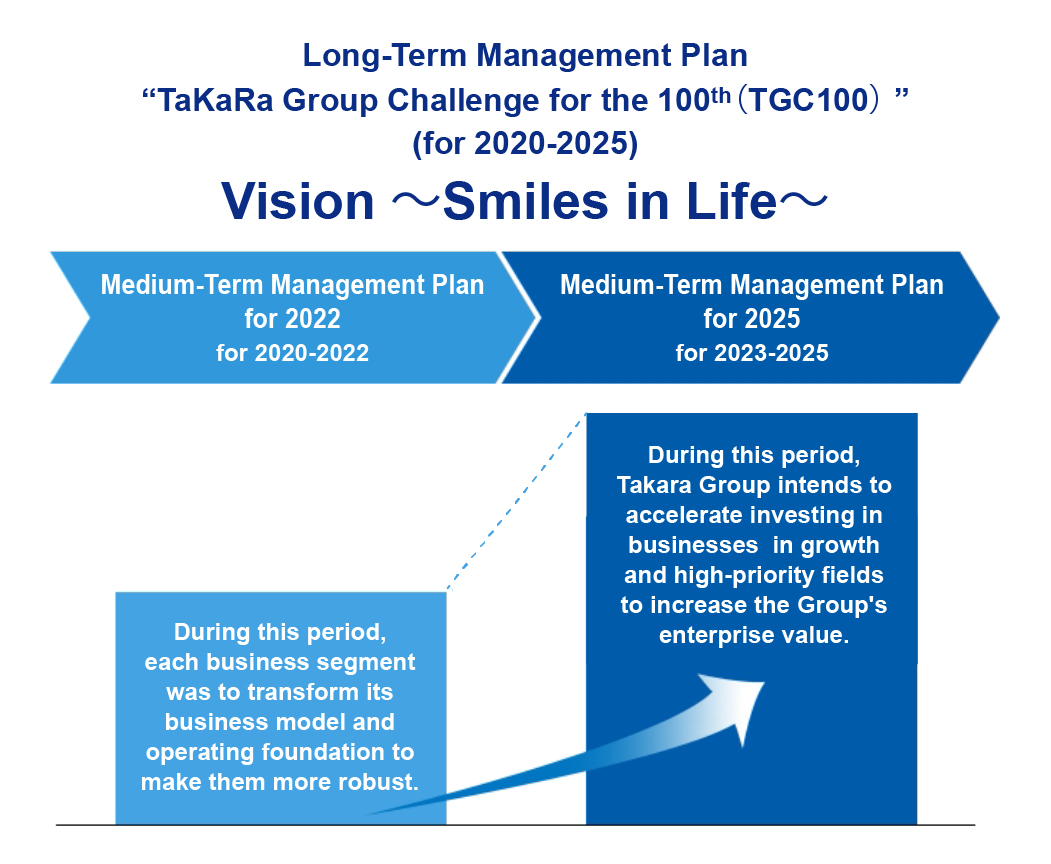
Investments of 88.0 billion yen will be made across the Group toward in growth and high-priority fields, with the goal of establishing global and sustainable business models and increasing our enterprise value.
In the fiscal year ending March 31, 2026, the Group aims to post no less than 420.0 billion yen in consolidated net sales, 38.0 billion yen in consolidated operating income, an overseas sales ratio of 60% or more (60% or more, excluding Takara Bio Group), an ROE of 9.0% or more, and an ROIC of 7.5% or more.
Since the financial targets for TGC100 set in 2020 have been met, they will be replaced with the financial targets for the Medium-Term Plan.
※ growth and high-priority fields
Takara Shuzo:Enhance the safety and security of production systems; develop and nurture "hit" products; focused brand development
Takara Shuzo Int’l Group:Expand food wholesale sites in North America and Europe; expand Washu (A general term for Japanese traditional alcoholic beverages under the Liquor Tax Act such as refined sake, shochu, and mirin, including innovative Japanese alcoholic beverages that incorporate Japanese elements)
Takara Bio Group:Expand the reagents and equipment business; expand the CDMO (contract development and manufacturing organization) business; maximize the value of drug discovery platform technologies
「Smiles in Life ~ Smiles are Life's Treasures ~」
The Takara Group aspires to use its proprietary technology to produce great-tasting products and revolutionary biotechnology to safely and reliably deliver diverse value in the Washu, Japanese food, and life science categories and with all these efforts, we are determined to help people around the world enjoy lives full of smiles with a sense of well-being.
※We have updated our vision from "Smiles in Life" which was released in May 2020, to "Smiles in Life - Smiles are the Treasures of Life," which is aligned with the initiatives of the "TaKaRa Group Medium-Term Management Plan for 2025".
Reinforce the Group’s technical prowess, product competitiveness, and brand position so as to deliver diverse value to the Washu and Japanese food markets and in the life science industry to establish a more prominent presence in the global market and ensure sustainable and accelerated growth.
- Consolidated net sales: 420 billion yen or more
- Consolidated operating income: 38 billion yen or more
- Percentage of net sales from overseas operations: 60% or more(60% or more for Takara Group except for Takara Bio Group)
- ROE 9.0% or more
- ROIC 7.5% or more
<reference>
Financial targets for TGC100(before change),Consolidated net sales:340 billion yen or above, Consolidated operating income:23 billion yen or above,Percentage of net sales from overseas operations:44% or above,ROE:8% or above
Leverage its top position in the Washu market in Japan to switch to value-added business management, which will serve as a basis for achieving profitable growth and leading the Group’s effort to remain a global leader in Washu.

Become a global leader*1 in the Washu and Japanese food business by bolstering the global sales of Washu and expanding the global wholesaling network for Japanese food.
*1. Based on sales exports from Japan, local production overseas, and the overseas Japanese food wholesale business

Takara Shuzo and the Takara Shuzo International Group to work together toward the common goal of becoming a global leader in Washu and Japanese food*2.
*2:Based on sales in Japan, exports from Japan, local production overseas, and the overseas Japanese food wholesale business
Become a drug-discovery company poised to create new therapeutic modalities by developing basic technologies for biological drug discovery through the research reagent and equipment business and the CDMO business.

Fulfill their defined missions depending on their positionings and roles in the Takara Group and contribute to the Group’s efforts to achieve better business performance and increase its enterprise value.
Become more effective and efficient in providing global management and support services to increase the Group’s enterprise value and enhance cohesion among Group companies.
The Takara Group intends to accelerate investing in businesses in growth and high-priority fields and motivate employees to achieve greater productivity and drive innovation at work.
In addition, we will establish and enhance the Group’s two unique business models with global and sustainable implications. All these efforts will enable us to remain on the growth path and achieve the Group’s Vision.Furthermore, we will upgrade our corporate communications programs as part of our efforts to increase the Group’s enterprise value.
- 3-year investment plan 88 billion yen, ROIC target of 7.5% or more
- Takara Group’s two unique business models
- A general term for Japanese traditional alcoholic beverages under the Liquor Tax Act such as refined sake, shochu, and mirin, including innovative Japanese alcoholic beverages that incorporate Japanese elements
- A general term for traditional Japanese food originating in Japan and food originating overseas and adapted in Japan into innovative Japanese food
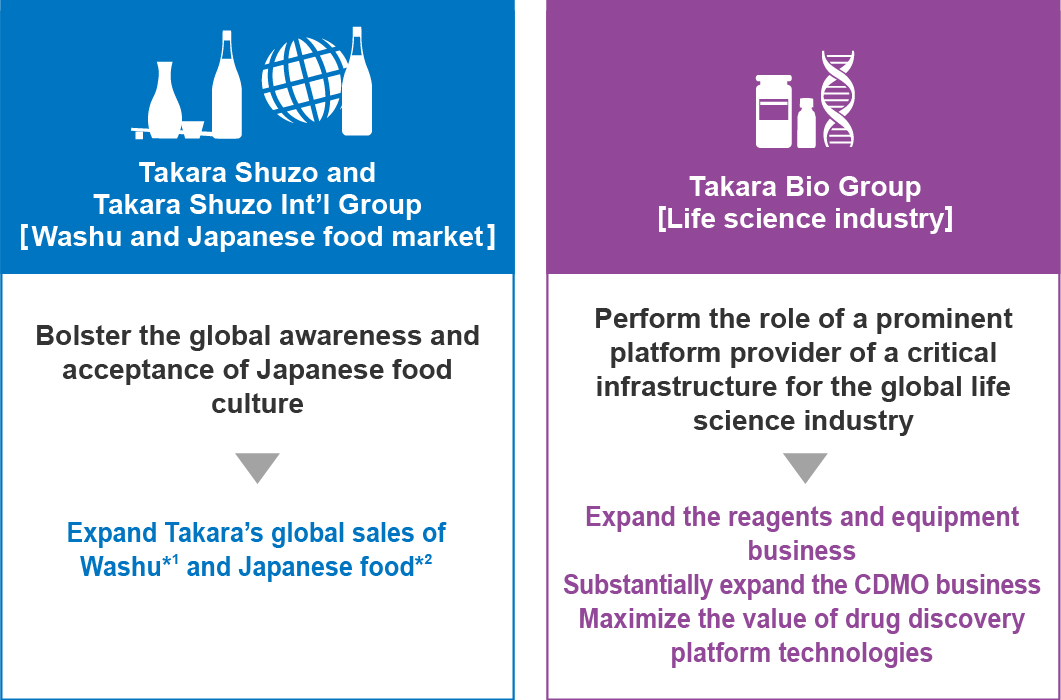
- We will renew our corporate culture and foster a sense of satisfaction by diversifying the Group's human resources and increasing employee engagement, while taking steps to enhance our human resources portfolio required for growth and high-priority fields.
- We will renew our operations and make it easier to work by updating our business operation with paperless systems and digitalization, and rebuild the domestic Group companies' core systems.
- We will comply with disclosure standards including the TCFD framework as appropriate, and enhance our initiatives for solving social issues through our business.
- Actions to be taken in the Medium-Term Plan
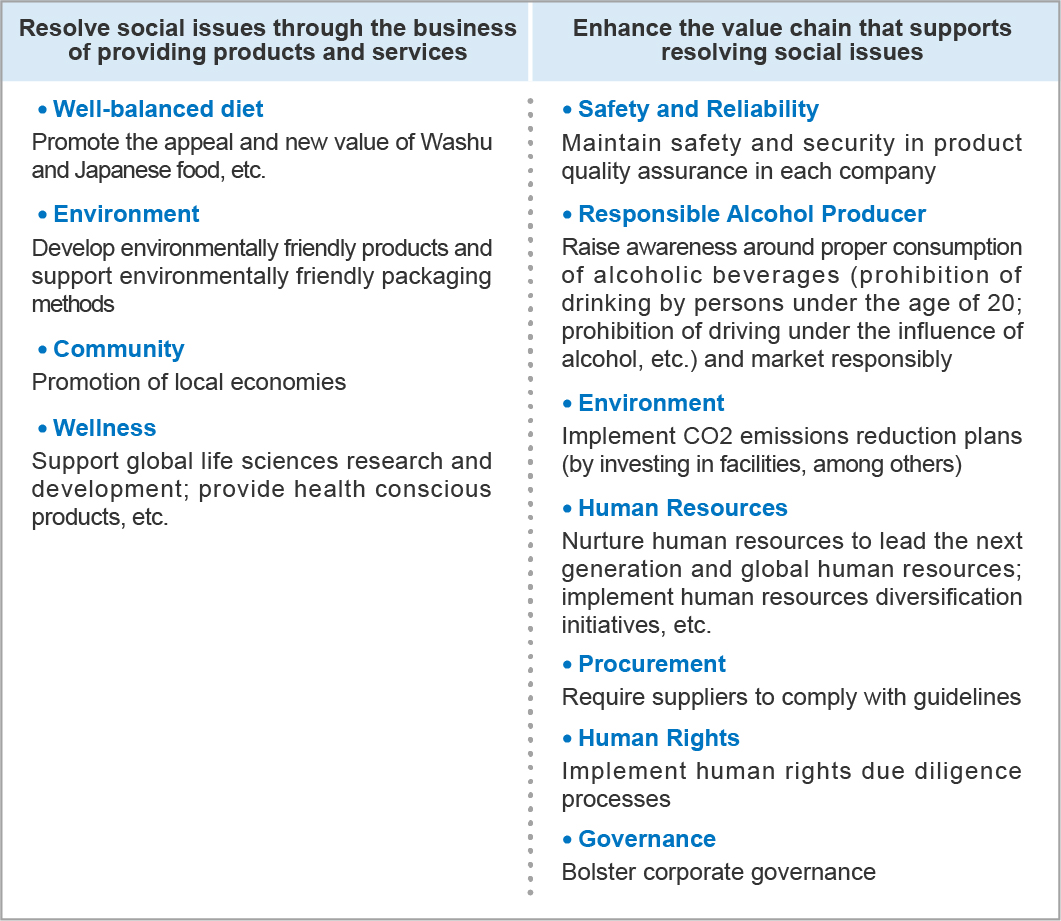
- We aim to increase enterprise value by building understanding, sympathy, and appreciation with internal and external stakeholders.
- Consolidated net sales: 420 billion yen or more
- Consolidated operating income: 38 billion yen or more
- Percentage of net sales from overseas operations: 60% or more(60% or more for Takara Group except for Takara Bio Group)
- ROE 9.0% or more
- ROIC 7.5% or more
To maintain the global leadership position in the Washu market, Takara Shuzo leverages its engineering excellence and “Made-in-Japan quality”※ to develop and market products that create new demand in growth areas, and also to enhance its brand equity. The company works more closely with the Takara Shuzo Int’l Group to resolve social issues and bolster its profit and profit margin.
※Takara's promise of high-quality, world-class global products produced in Japan, as a company regarded as high quality and trustworthy in safety and security within Japan and able to deliver the same value to people around the world.
The Takara Shuzo Int’l Group works more closely with Takara Shuzo and other Takara Group companies around the globe to expand its portfolio of export and locally manufactured products, as well as to enhance its global presence as a wholesaler of Japanese food with a strength in Washu. All these efforts will enable the group to take full advantage of having both Washu and Japanese foodstuffs in its offerings in order to bolster the global awareness and acceptance of Japanese food culture. The group intends to play its part in resolving social issues and become a global leader in the Washu and Japanese food markets.
Takara Shuzo and the Takara Shuzo Int’l Group work together to develop traditional※3 and innovative※4 Washu products that meet the needs and trends of the global markets, as well as to enhance brand marketing, with a focus on building MIO into a global brand. All these efforts will enable us to market Washu more widely in the world and bolster Takara's presence as a global leader in the Washu market.
※3 Sake that meets the standards set forth in the Liquor Tax Act of Japan
※4 Innovative Japanese alcoholic beverage that expands the sphere of conventional Washu
The Taraka Bio Group boosts R&D spending to develop new reagents and equipment, expand CDMO service offerings, and develop base technology for creating additional modalities. All these efforts will enable the group to expand its business into clinical and drug-discovery areas faster and to enhance its presence as a prominent platform provider of a critical infrastructure for the global life science industry.
Domestic Group companies allocate more of their corporate resources to businesses in growth and high-priority fields. This will enable us to enhance our business models to sustain growth, while helping the Takara Group improve its ROE and resolve social issues.
Takara Holdings’ corporate departments work closely with the Group’s business units to make group-wide corporate management more robust in order to better sustain the Group’s global business models. At the same time, we build a workplace environment in which all Group employees have a sense of pride and purpose toward improving productivity and driving innovation. All these efforts will help enhance the effectiveness of the process for achieving the Group Vision and earn a higher level of trust from internal and external stakeholders.
- Create cashflow by increasing the efficiency of assets and through the sale of strategic shareholdings while enhancing global cash management, for the purpose of accelerating investments in growth and high-priority fields based on the maintenance of sound financial fundamentals.
- Expand monitoring from the perspective of investment efficiency.
- Provide shareholder returns commensurate with profit levels (payout ratio of about 35%).
- 機動的な自己株式取得を実施する。
We have updated the description of our Vision, or what we aspire to be, in TGC100 to align with the content upheld in the Medium-Term Plan. With “Smiles in Life - Smiles are Life's Treasures” as our new Vision, we placed “Smiles in Life” at the top of the Vision as the most important keyword within the Takara Group.
We have also defined smiles as being an important, irreplaceable part of human life, thus establishing a firm connection between “Smiles in Life” and the Takara Group. The word "Life" is intended to represent both the “lifestyle” provided by Takara Shuzo and the Takara Shuzo International Group and the “vitality” provided by the Takara Bio Group.
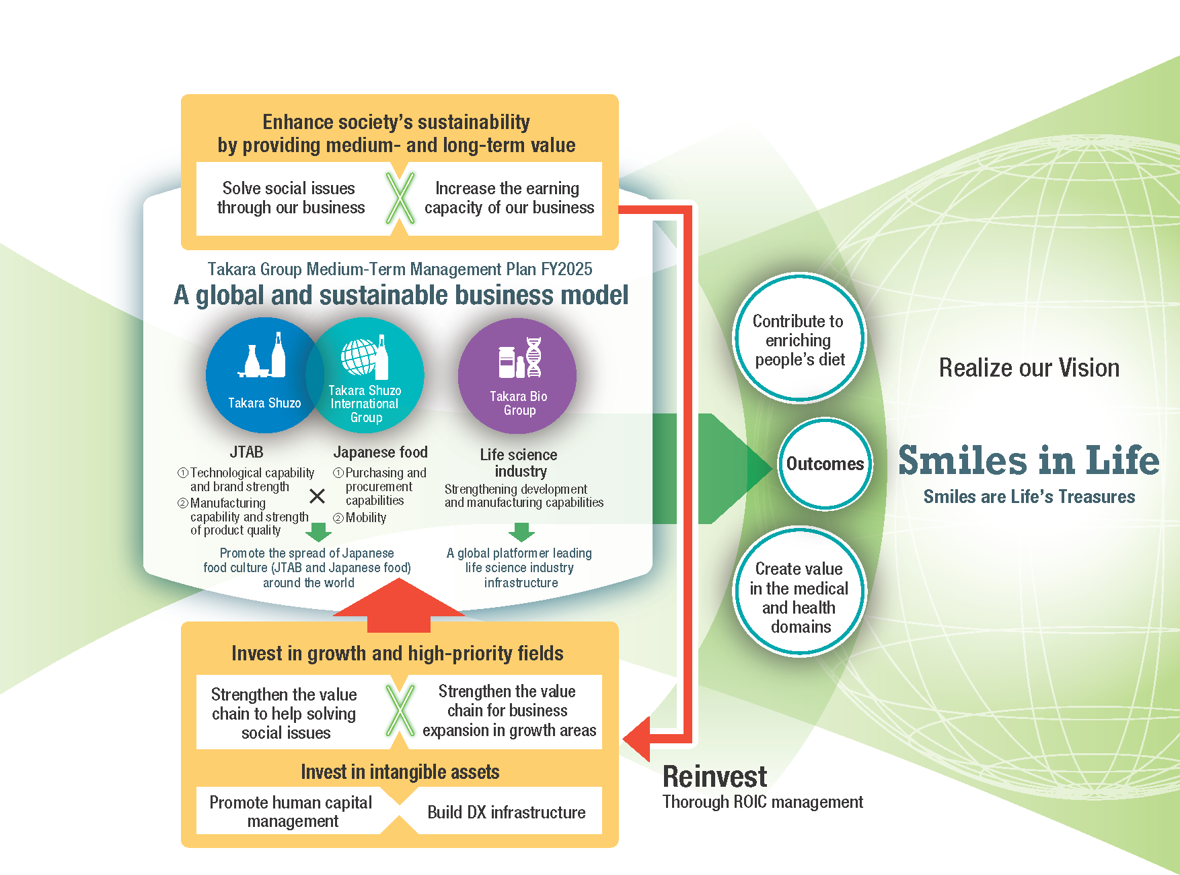
Based on our corporate philosophy, which is “Contributing to the creation of a vital society and a healthy lifestyle through our fermentation technology and biotechnology in a way that achieves harmony with nature,” the Takara Group has benefited society by unlocking new potential in the culinary, lifestyle, and life science fields through our fermentation technologies for traditional Japanese sake and our cutting-edge innovation in biotechnologies and by continuing to create new value.
The preservation of a rich natural environment is a major premise for the business continuity of the Takara Group, which engages in business activities on the basis of the bounty of diverse natural resources such as grains, water, and microorganisms. In addition, in handling business related to food and medicine, the Takara Group’s most important theme is to deliver safe and reliable goods, products, and services. At the same time, we must also address various social issues, including those related to alcohol.
In recent years, the social environment surrounding the Group has undergone rapid change, and with the need for a global response to such diverse issues as climate change, biodiversity conservation, resource conservation, and respect for human rights, corporate entities face an increasing responsibility to create a sustainable society.
In our long-term management vision, “TaKaRa Group Challenge for the 100th,” the Group has made a declaration that it will contribute to the realization of healthy and fulfilling daily lives that are filled with connections between people and people’s smiles. Recognizing that it is necessary to take greater initiatives to resolve various social issues if we are to continue to achieve the creation of social value through business activities into the future, we have now formulated the Takara Group Sustainability Policy in line with our long-term management vision.
The Takara Group Sustainability Policy takes up ten important issues (materiality), including “safety and reliability,” from among the social issues surrounding the Group, and lays out initiative policies for each one, taking into account the expectations of stakeholders and the impact on the Group’s business.
Going forward, we will further proceed with initiatives based on these policies and will also work on the establishment of long-term goals.
The Takara Group aims to be a corporate group that is trusted by its stakeholders, and will contribute to the realization of a sustainable society by continuing to create social value through our business activities.
Takes up ten important issues (materiality), including “safety and reliability,” from among the social issues surrounding the Group.
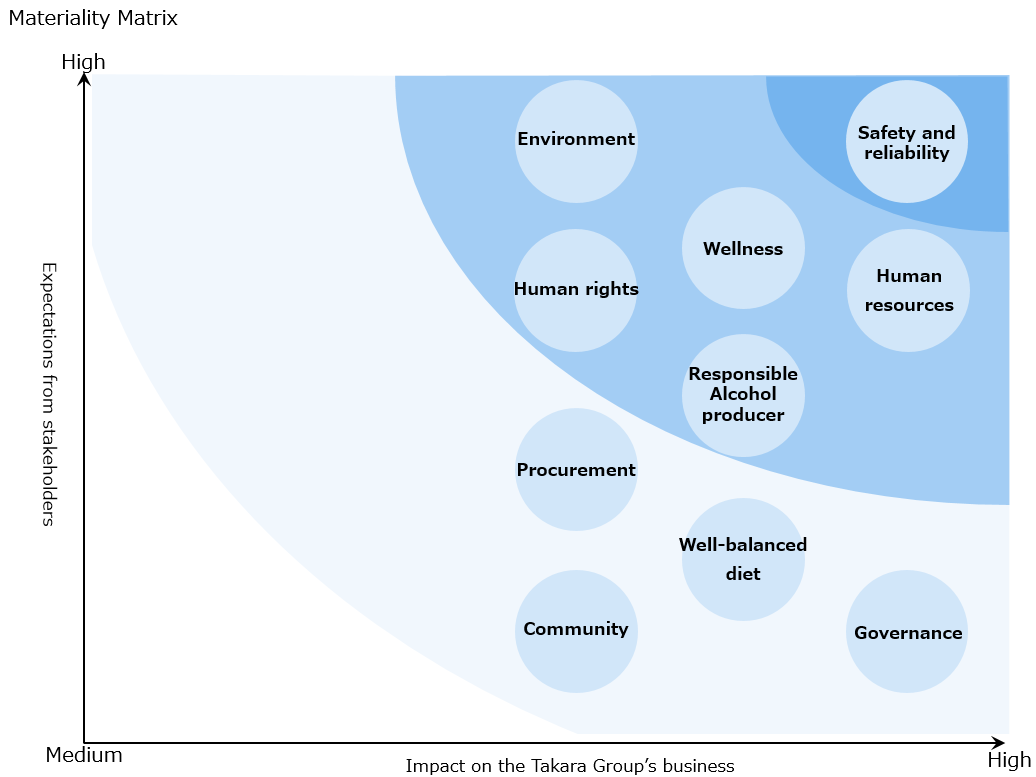
- This content contains information about the long-term management plan "TaKaRa Group Challenge for the 100th".
-
 Takara Group Sustainability Policy
(902KB)
Takara Group Sustainability Policy
(902KB)
- This content contains information about TaKaRa Group Medium-Term Management Plan for 2025
-
 IR Release (May. 11, 2023) Takara Holdings Prepares TaKaRa Group Medium-Term Management Plan for 2025
(643KB)
IR Release (May. 11, 2023) Takara Holdings Prepares TaKaRa Group Medium-Term Management Plan for 2025
(643KB)

